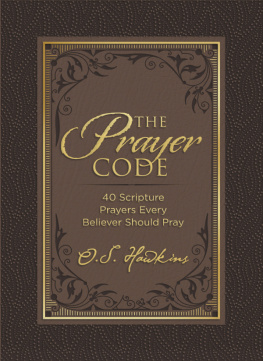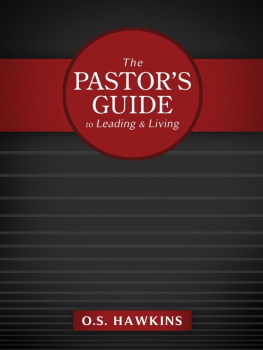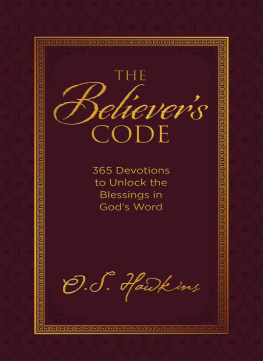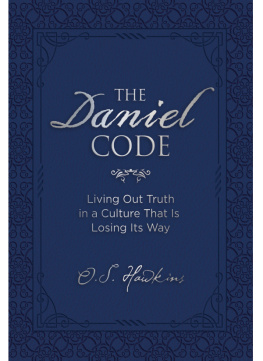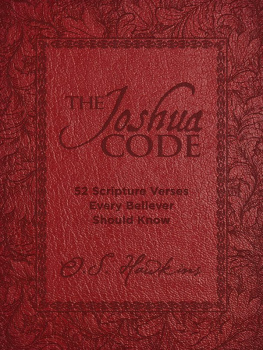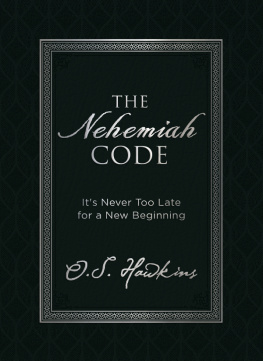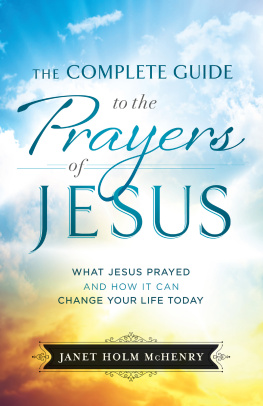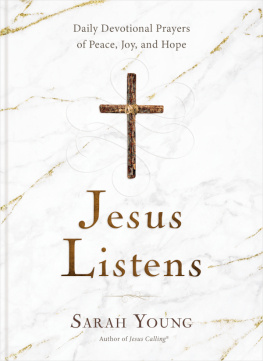The Prayer Code
2021 Dr. O. S. Hawkins
All rights reserved. No portion of this book may be reproduced, stored in a retrieval system, or transmitted in any form or by any meanselectronic, mechanical, photocopy, recording, scanning, or otherexcept for brief quotations in critical reviews or articles, without the prior written permission of the publisher.
Published in Nashville, Tennessee, by Thomas Nelson. Thomas Nelson is a registered trademark of HarperCollins Christian Publishing, Inc .
Thomas Nelson titles may be purchased in bulk for educational, business, fund-raising, or sales promotional use. For information, please email SpecialMarkets@ThomasNelson.com.
Unless otherwise noted, Scripture quotations are from the New King James Version. 1982 by Thomas Nelson. Used by permission. All rights reserved.
Scripture quotations marked ESV are taken from the ESV Bible (The Holy Bible, English Standard Version), copyright 2001 by Crossway, a publishing ministry of Good News Publishers. Used by permission. All rights reserved.
Scripture quotations marked KJV are taken from the King James Version. Public domain.
Any internet addresses, phone numbers, or company or product information printed in this book are offered as a resource and are not intended in any way to be or to imply an endorsement by Thomas Nelson, nor does Thomas Nelson vouch for the existence, content, or services of these sites, phone numbers, companies, or products beyond the life of this book.
ISBN 978-1-4002-2929-1 (HC)
ISBN 978-1-4002-2927-7 (audiobook)
ISBN 978-1-4002-2928-4 (eBook)
21 22 23 24 25 DSC 10 9 8 7 6 5 4 3 2 1
Information about External Hyperlinks in this ebook
Please note that footnotes in this ebook may contain hyperlinks to external websites as part of bibliographic citations. These hyperlinks have not been activated by the publisher, who cannot verify the accuracy of these links beyond the date of publication.
P rayer, simply defined, is talking to God. Like all communication, it involves two-way conversation, listening, and speaking. Throughout the sixty-six books of our Bibles, there are over 650 different recorded prayers. Among them are prayers of penitence, prayers of praise, prayers of petition, prayers for protection, and prayers for provision. From the longest prayerJesus high intercessory prayer consuming the entire seventeenth chapter of Johns gospelto the shortest prayer, Peters desperate pleaLord, save me (Matthew 14:30)we find prayers from men and women from all walks of life in all types of real-life situations. From the first recorded prayer in the Bible, involving Gods conversation with Adam and Eve in the garden of Eden (Genesis 3:89), to the last prayer in the Bible, Johns plea from Patmos, Even so, come, Lord Jesus (Revelation 22:20), we find prayers to emulate no matter what our present needs may be today.
Prayer is the battlefield of the Christian life. Many believers clothe themselves with all the armor Paul described in Ephesians 6:1117. That is, we wear the helmet of salvation, we hold the shield of faith, we effectively use the sword of the Spirit, which is the Word of God. We get all dressed for the battle, but many of us do not know where the battle is being fought. The very next verse tells us: Praying always with all prayer and supplication in the Spirit (v. 18). Again, prayer is the battlefield of the Christian life, the place where the struggles of life are won. It is impossible to win a war if we do not know where the battle is being fought.
It is fascinating that the only thing the disciples ever asked Jesus to teach them to do was to pray. They never asked Him to teach them to preach, or heal, or evangelize, or organize. They had watched His every move for almost three years and knew the secret of His life was in the place of prayer. At times He went up into the mountains and prayed all night. Often, they watched as He arose before daylight to pray. He prayed before every great undertaking. He prayed after each significant achievement. The busier His life became, the more we find Him isolating Himself in the secret place of prayer. Thus, the only thing His faithful followers asked of Him was Lord, teach us to pray (Luke 11:1).
In this book were making the same request in our time: Lord, teach us to pray. As we journey through these pages, we will find a pattern of prayer helping to lead us through our own time of calling on Him ourselves. The Prayer Code is not simply some analytical attempt to study prayer but an examination of people in Scripture who beat out these principles on the anvil of personal experience in order for us to apply these time-tested prayer principles in our own daily lives.
It is now time to begin the journey of unlocking forty Scripture prayers every believer should pray. The Prayer Code is written in the same vein as many of the preceding Code books. After each reading you will find a Code Word that will help you remember and live with the truth of the chapter each and every day. Write it down. Keep it with you throughout your day. You will also find a Prayer Promise that you can claim for your very own each day. So, lets begin the journey by making this ancient and earnest request our very own: Lord, teach us to pray.
A PRAYER OF AFFECTION
Our Father...
MATTHEW 6:9
H ow many times have those two words escaped your lips over the years of your own Christian experience? Hundreds? Thousands? They have become so familiar that we often rush through and skip over them in our quest to get to the more direct requests of this model prayerGive us... forgive us... deliver us. But take a step back for just a moment and think on those wordsOur Father. No matter who we might be, whether we have just begun the faith journey or have been walking this path for decades, we can all begin our prayer time with this foundation of true prayerOur Father.
I remember the day when I made the marvelous discovery, as a new believer, that I did not have to enter into prayer as some beggar cowering down at the back door, begging for a handout. I am Gods own child and seated at His own table. This gives me confidence and even boldness to approach Him. Before we rush once again into the repetition of our Lords Prayer, lets pause just a moment at these first two words.
AN UNSELFISH RECOGNITION
The foundation of true prayer is built on an unselfish recognition. He is our Father. In fact, a careful reading of this model prayer reveals the repeated use of these plural pronounsour and us. So often we approach the Lord in prayer with a string of I, I, I or me, me, me or my, my, my. When we pray as Jesus taught us, there are no singular pronouns, only plural ones. He is not just My Father; He is Our Father. To my earthly family I am an only child, but in the family of God there is no such thing.
To my earthly family I am an only child, but in the family of God there is no such thing.
When we pray, Our Father, we are acknowledging that we are a part of a big family. Some are different in doctrine, race, culture, or social standing. But the family includes all believers. I have prayed this prayer in countries where believers were under intense persecution or where they were dominated by caste systems, in Africa in open-walled churches under tin roofs, with Arab believers in Muslim countries, in Cuba with those still oppressed by a failed communist regime, in Israel with Jewish believers, and with my Black and Hispanic brothers and sisters in America. Saints in prayer all appear as one. This is what Jesus prayed for us in His high intercessory prayer when He prayed,... that they all may be one... that the world may believe that You sent Me (John 17:21).

